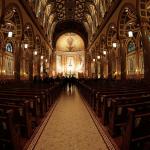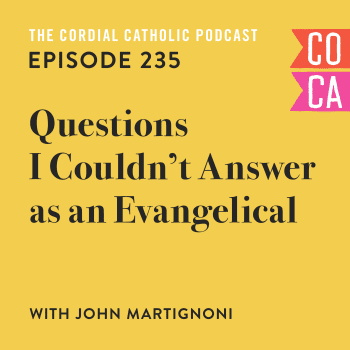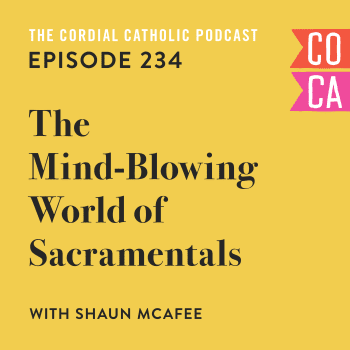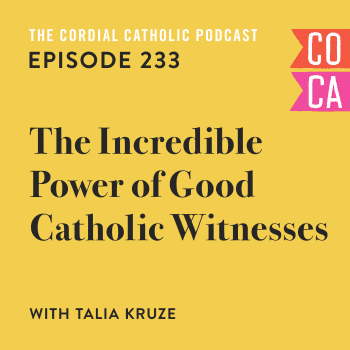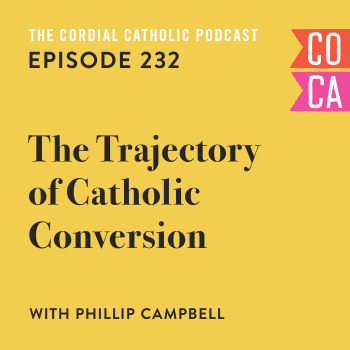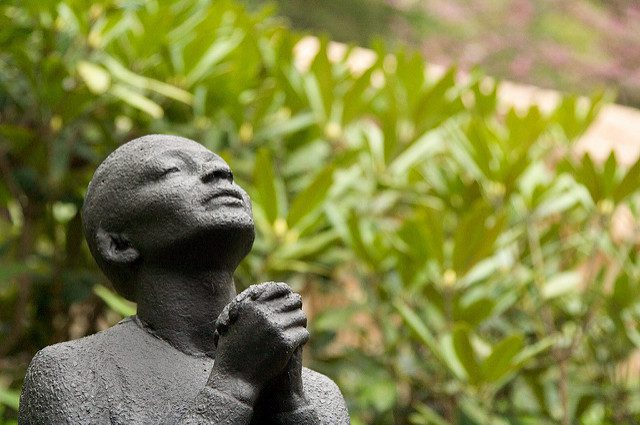
Photo Credit: Via Tsuji.
As a young Evangelical I was taught that rote prayer was the devil. And, guys, it was bad.
I can remember, clearly, sitting in class as part of our Sunday School Education Hour for Adults and learning that even to repeat the Lord’s Prayer should be considered vain repetition. To be effective, to be godly, prayer had to be spontaneous and original. Right from the heart, out through the lips.
Repeated, written prayers were the sort of stuff just one shade shy of evil.
Like the fallen faith of the Pharisees.
Of course, the worst of the lot of vain repeaters were Catholics. With their rosaries and novenas and various devotions these Catholics were in league with the devil—repeating non-sense over and over again with no sense of faith in it at all.
They weren’t praying they were repeating. No more holy than doing the dishes: wash, rinse, repeat.
I’ve come a long way since then. Through reading, learning, and, of all things, prayer, I’ve come to see the Catholic Church in an entirely new light. And, I’ve become Catholic. And, of all things, my prayer life has never been more on point. Never been so rich, so full, and so utterly lazy.
And never been so awesome.
One of the incredible, grace-filled things about the Catholic Church is the enormity of tradition in which its steeped. In a previous lifetime, I would’ve seen tradition as something stodgy, sinful, and to be utterly avoided. But that narrow view collapsed under the weight of a genuine exploration of the faith.
And with that, has come an appreciate for written prayers.
My doubt about the evilness of written prayers began simply enough: why re-invent the wheel, I wondered. Why do we have to pray in our own, unique, spontaneous ways? What makes this approach more Biblical or more right? What makes the written prayers of the ancient Church inherently wrong? The answer, I found, was nothing.
Most definitely we’re to pray spontaneously and the Bible makes that clear, as does the teaching of the Church down through the ages. But there’s nothing better about praying in that way. As an evangelical I learned that rote prayers were wrong because we believed that what made the Pharisees ungodly was their penchant for repeating prayers over and over again—not the contents of their heart, and their faith.
On that point, we were wrong.
Like the Pharisees, we condemned faith practices that valued written, repeated prayers because we thought that the mistake of the Pharisees was to do the same thing over and over again. In actual fact, the Pharisees error—for which Jesus often condemned them—was a lack of faith, and judgement of others. It wasn’t their prayers but the way they were praying, and this was a crucial difference.
In fact, rote prayers were a deeply embedded practice in Jewish faith life—and this faith life was not condemned by Jesus but affirmed, and brought to fulfillment. The Jewish way of praying, more to the point, continued on in the Christian Church and has been adopted and built upon by praying Christians down through the ages.
And this brings me to how I pray.
I’ve prayed a lot of different ways in my Christian life, some more successful than others.
As a younger evangelical I fastidiously kept a prayer journal. Recording requests for prayer and prayer intentions along with a section optimistically titled Prayers Answered which was largely left blank—God works in mysterious ways after all.
As I’ve grown up, both in faith and age, I’ve prayed in different ways since but mostly spontaneously and mostly in fits and starts. The time I’d often schedule for prayer fell at the very end of the day and I was often—excuse alert!—too tired to make it all the way through. As a young married couple, our prayers before meals were about as non-existent as meals at our supper table; eating in front of the TV became a bad habit and if you don’t sit to eat at a table you probably won’t pray before you eat either.
At any rate, one of the enormous graces of becoming Catholic has been exposure to a whole new world of prayer: the written prayer, and more specifically, the Liturgy of the Hours.
The Divine Office.
Continuing in the Jewish tradition of praying at set hours of the day, the Divine Office is a big old book of prayers handed down by the Catholic Church since nearly the beginning of the faith itself.
And it’s awesome.
While all clergy are obligated to pray The Office, the Second Vatican Council encouraged laity to begin to pray it too.
In my eagerness to try out new and exciting Catholic things I gave the Divine Office a whirl—and I haven’t looked back.
Praying fixed, written prayers twice a day (I pray the Morning and Evening Offices, which is the Church’s recommended route for the laity) seemed like a daunting task at first. Carving out fixed time to pray, about fifteen minutes for each office, seemed difficult—at times too difficult but it was also almost immediately rewarding and having pushed through, having made it into a daily routine, I can unreservedly say that it’s been an incredible, life-changing exercise of faith.
The laziest, yet most awesome prayer life ever.
See, on one hand, I don’t need to make up my prayers. As the father of a toddler, with another on the way, this is honestly a huge burden off my back. And I understand now more fully what the Scriptures say about prayer sometimes being a groaning of the spirit. I don’t need to know what to pray; the Office has it right there for me, in black and white and there’s a special kind of grace in that.
Praying through the words of the ancient authors of the psalms or the words penned by St. Paul or St. Peter two thousand years ago is a very meaningful, prayerful experience. To join my groanings to theirs. And rather than these rote, written prayers feeling languid or half-hearted I’ve found it to be the complete opposite. The Office is full of life and vigor; it’s collection of psalms and written prayers are vibrant and life-giving.
And to know that thousands of Catholics (and Anglicans and Orthodox!) are praying the same prayers, all over the world—to know that Christians down through the ages have prayed these same fixed prayers too—is a very grounding and affirming thing indeed.
It reminds me that my sufferings, my prayer intentions, are not only my own but something we all carry, together, and that’s beautiful.
The difference it makes in my faith life is palpable.
Never before have I prayed so often, so regularly, and never before has it been so easy. In a beautiful and ironic way, praying the Divine Office has turned my prayer life into the laziest, most rewarding faith experience I’ve ever known.


